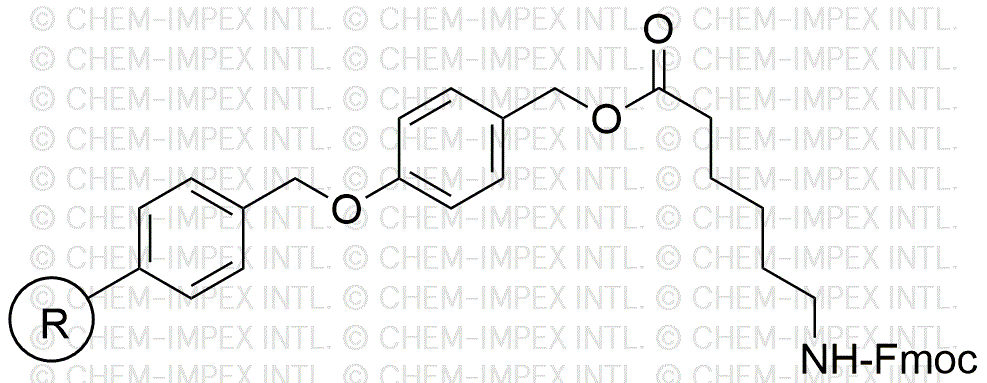Fmoc-e-aminocaproic acid 4-alkoxybenzyl alcohol resin is widely utilized in research focused on:
- Peptide Synthesis: This resin is essential in solid-phase peptide synthesis, allowing researchers to create custom peptides efficiently. Its Fmoc (9-fluorenylmethoxycarbonyl) protecting group facilitates easy deprotection, streamlining the synthesis process.
- Drug Development: In pharmaceutical research, it aids in the development of peptide-based drugs, providing a reliable method for producing bioactive compounds that can lead to novel therapeutics.
- Bioconjugation: The resin can be used for attaching peptides to other biomolecules, enhancing the functionality of drugs or diagnostic agents, which is crucial in targeted therapy and personalized medicine.
- Material Science: It serves as a building block in creating advanced materials, such as hydrogels and nanocarriers, which are used in drug delivery systems, improving the efficacy of treatments.
- Research in Biotechnology: The resin is valuable in producing peptide libraries for screening, enabling researchers to identify potential leads for new drugs or therapeutic strategies.
General Information
Properties
Safety and Regulations
Applications
Fmoc-e-aminocaproic acid 4-alkoxybenzyl alcohol resin is widely utilized in research focused on:
- Peptide Synthesis: This resin is essential in solid-phase peptide synthesis, allowing researchers to create custom peptides efficiently. Its Fmoc (9-fluorenylmethoxycarbonyl) protecting group facilitates easy deprotection, streamlining the synthesis process.
- Drug Development: In pharmaceutical research, it aids in the development of peptide-based drugs, providing a reliable method for producing bioactive compounds that can lead to novel therapeutics.
- Bioconjugation: The resin can be used for attaching peptides to other biomolecules, enhancing the functionality of drugs or diagnostic agents, which is crucial in targeted therapy and personalized medicine.
- Material Science: It serves as a building block in creating advanced materials, such as hydrogels and nanocarriers, which are used in drug delivery systems, improving the efficacy of treatments.
- Research in Biotechnology: The resin is valuable in producing peptide libraries for screening, enabling researchers to identify potential leads for new drugs or therapeutic strategies.
Documents
Safety Data Sheets (SDS)
The SDS provides comprehensive safety information on handling, storage, and disposal of the product.
Product Specification (PS)
The PS provides a comprehensive breakdown of the product’s properties, including chemical composition, physical state, purity, and storage requirements. It also details acceptable quality ranges and the product's intended applications.
Certificates of Analysis (COA)
Search for Certificates of Analysis (COA) by entering the products Lot Number. Lot and Batch Numbers can be found on a product’s label following the words ‘Lot’ or ‘Batch’.
Numéro de catalogue
Numéro de lot/série
Certificates Of Origin (COO)
This COO confirms the country where the product was manufactured, and also details the materials and components used in it and whether it is derived from natural, synthetic, or other specific sources. This certificate may be required for customs, trade, and regulatory compliance.
Numéro de catalogue
Numéro de lot/série
Safety Data Sheets (SDS)
The SDS provides comprehensive safety information on handling, storage, and disposal of the product.
DownloadProduct Specification (PS)
The PS provides a comprehensive breakdown of the product’s properties, including chemical composition, physical state, purity, and storage requirements. It also details acceptable quality ranges and the product's intended applications.
DownloadCertificates of Analysis (COA)
Search for Certificates of Analysis (COA) by entering the products Lot Number. Lot and Batch Numbers can be found on a product’s label following the words ‘Lot’ or ‘Batch’.
Numéro de catalogue
Numéro de lot/série
Certificates Of Origin (COO)
This COO confirms the country where the product was manufactured, and also details the materials and components used in it and whether it is derived from natural, synthetic, or other specific sources. This certificate may be required for customs, trade, and regulatory compliance.

